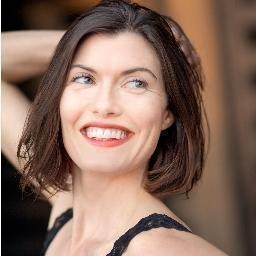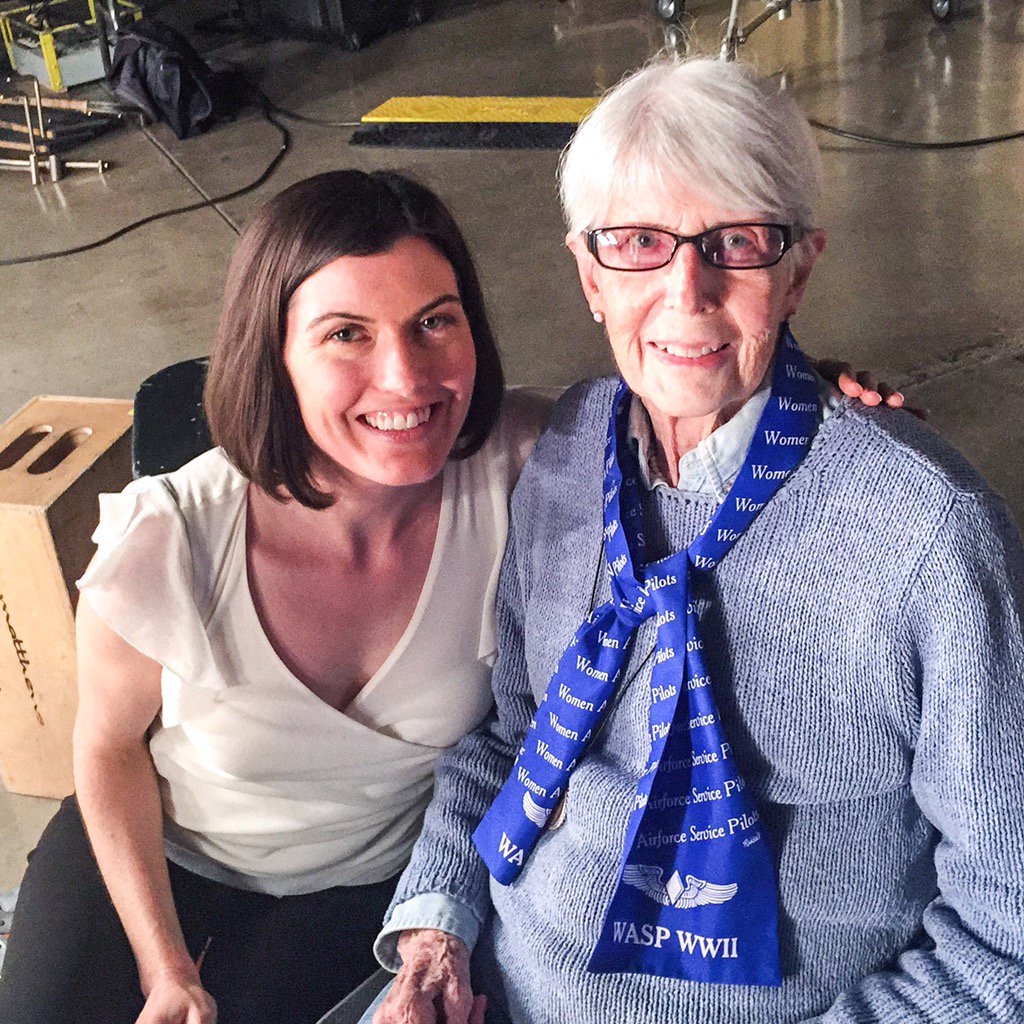Anyone who knows me is aware of the fact that I have an enchantment with strong women. I’m not sure why exactly, but maybe my background and the fact that I used to outwardly acquiesce so easily is part of the reason why I am fiercely supportive of women who follow their passions no matter the obstacles in their way. Add that to my fascination with history, and it was no surprise that I found FlyGirls and Hilary Prentice. Hilary is the producer of this “work in progress,” and earlier this summer, she and I were able to chat quite extensively about the origin of the series and what the next step is for this aspiring show.
RH: I think I may have found you and FlyGirls through the Artemis Film Festival.
HP: That could be. They are big supporters of ours. We were actually on one of their panels at one point. And they have done twitter parties with us. And they typically retweet us and get the word out.
I know at the festival this year, they had a documentary about a female flyer.
I think it was on Violet Cowden, Wings of Silver.
Yes, that sound right. So I’m pretty sure it’s through them that I found you. I am very passionate about promoting independent works.
Well, we are independent right now, primarily to retain creative control over the project, but our plan is to partner with a production company or a place like Netflix, which they usually have their production companies that they like to work with. The trick is that you usually find a company that has a relationship with one of those networks, but sometimes you know someone who knows someone at one of those networks. Or maybe Amazon. The BBC makes a lot of sense because a lot of our series takes place in England. We certainly would love to have BBC distribution. What we’ve been doing is building this grassroots campaign fundraising, and we are in phase two of fundraising. We were able to get our nonprofit fiscal sponsor earlier this year.
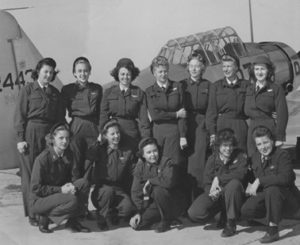 Well, that’s great. I was going to ask you about fundraising for this project.
Well, that’s great. I was going to ask you about fundraising for this project.
We did our fundraising for what you would call our initial seed money for the project. What we’re raising money for now is for us to hire an A-list writer–two writers. We would love for the head of the series to be woman writer–an American woman–and then a UK or British woman. We would love to get Abi Morgan, who wrote The Suffragette. That would be a dream. We feel that having a British writer is really important ’cause a lot of the series does take place in England. So to have that voice and that perspective would be really great. Our nonprofit fiscal sponsor is From The Heart Productions. We had tried a couple of others, but we couldn’t find the right fit till this one came along. What this means is that we can raise money through From The Heart Productions, and we have a couple of companies like OneHope Wine who are sponsoring us, but they need a nonprofit sponsor. We did an event in May, and OneHope Wine was our sponsor for that event, and they were able to donate some things. So people and our fans went on the website and bought wine, and then we got a percentage of the profits. So now it should be a lot easier. People should be able to do it directly from our website as long as our OneHope representative sets up a platform. We also have a coffee company that wants to come on and donate some of the profit–to have a special coffee brand. And we have our online store selling merchandise. But really what we’re going to be doing, now that we have secured our nonprofit sponsor, we’re going to be going after people to join what I call our “Pilot’s Cross Circle”. The Pilot’s Cross is a symbol that pilots see from the clouds. It’s a phenomenon. I don’t know if that happens now ’cause the planes are different today than they were back in the ’40’s. You would see the plane on the clouds, and it would be surrounded by a rainbow, and it was called the Pilot’s Cross. So our Pilot’s Cross Circle is asking for donors. The last phase, we looked to raising thirty to fifty thousand. Now we’re looking to raise a hundred to two hundred thousand. Ideally we’ll have twenty aviation groups–women in aviation or the 99s–who each will come in at five thousand. And if we get individual donors, that’s fine too, of course.
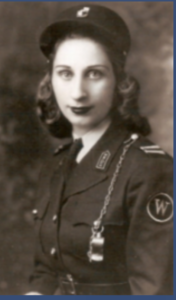 What was it that prompted you and your team to start this series?
What was it that prompted you and your team to start this series?
Matia Karrell (who sends her regrets by the way–she has to be on a shoot today)–I met her four years ago, and she had the idea for this project. She had been working and pitching this idea for twenty, twenty-five years–a long time. And she was also close to Violet Cowden, the woman that was featured in the documentary you mentioned earlier. It started for her when her mother died many years ago. She found a photograph of her mom in a uniform. We have that photograph on our website. She called the Boston Museum to ask what it was, and they didn’t know. It took a lot of calling and trying to find out. Eventually, she figured out that her mom was a plane spotter–which was a group of volunteer women–and there were white women and black women in the same volunteer group. Massachusetts was a little more integrated than other parts of the country. The military was segregated at that time. When she was doing her research, she thought she came across these women pilots who flew the planes for the military. And she thought that maybe her mom was one of them. But then she found out they were a volunteer group that spotted planes. They spotted enemy planes. But in finding out about these women, it just blew Matia’s mind. She just couldn’t believe that there were all of these women. She kept doing more and more research, and she got connected to some of these women who were still alive. There were obviously a lot more of them still alive twenty or twenty-five years ago. Now there’s probably a little less than a hundred of these women still alive. She made a promise to them and to herself that this story would be told. But she couldn’t believe that nobody knew about them. And I didn’t know about these women until I met Matia. I met her in 2012. I was floored–women flew planes for the U.S. military in WWII? I had no idea. We see these images of Rosie the Riveter, and they’re sort of iconic and we’re taught about them in school. How old is your daughter?
Thirteen.
Did you ask her if she knew that women flew planes in WWII?
I haven’t, but I doubt she knows because they just don’t teach history in schools as much any more.
If you look through their school textbooks, I can almost guarantee you they don’t mention these women. They do mention black men at Tuskegee. And they mention the Navajo Indians. They didn’t really talk about the women volunteering in any of the armed forces. They weren’t just volunteering; they were participating. A lot of women were doing office-type work, administration, and these women were flying the planes. They were testing the planes. It was very dangerous work. They were performing target practice exercises with the troops who were firing at them with live ammunition. It was really important, really dangerous work that they were doing. It was a time when aviation was constantly–you know, we were making leaps and bounds in planes and aviation technology. There was a lot we didn’t know. The war forced us to rapidly develop the jet engine. These women were flying planes that had been taken off the factory line and had never been flown before to make sure that everything was okay with them. And they would also do regular maintenance-type flights with the planes that did exist to make sure that everything was in line. They would also fly supplies to the East coast or to New York and let the men take the supplies from there because the women were not allowed to fly overseas. I mean the American women were not. So they would bring the planes to the border, and the men would fly them overseas. In England, the women were not military. They were civilian air corps. It was called the Air Transport Auxiliary–the ATA. And they were strictly civilians. They got paid the same as men and they got the same working conditions as men. The same thing. They were ferrying planes, but because they were overseas, they were ferrying them outside of England. And also they were under attack just by virtue of being in England. So they would fly in combat-type situations. They weren’t purposely flying combat missions. They were flying supplies up in the air, and the German planes were there too.
I still don’t really know a lot about women’s history because it was never something they taught when I was in school. And they still don’t do a very good job of teaching it in school. So those kinds of things always fascinate me because I love history. {pause} So with this mini-series, how many episodes are you planning?
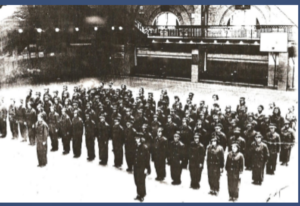 Right now, we’re thinking about ten episodes. That’s the number we have in mind. It is scripted, and there will be actors. It’s not a documentary. We are filming the women now, while we still have them, to be part of our special features on the DVD. There have been quite a number of documentaries in short form. I think PBS did a long documentary. But we really want to get away from the documentary style only because we want people to really dive in and feel the world and feel the characters.
Right now, we’re thinking about ten episodes. That’s the number we have in mind. It is scripted, and there will be actors. It’s not a documentary. We are filming the women now, while we still have them, to be part of our special features on the DVD. There have been quite a number of documentaries in short form. I think PBS did a long documentary. But we really want to get away from the documentary style only because we want people to really dive in and feel the world and feel the characters.
It also allows us to have a perspective. We can be looking at the socioeconomic status of women and really look at it through a modern lens. I mean, it’s a different generation. It’s so fascinating. They have a different perspective, viewpoint, and outlook. They didn’t think of themselves as pioneers or heroes or breaking down barriers or anything like that. They do want to be remembered. They were upset when the army said–here we are in the ’70’s graduating our first women graduates, and that’s what got them all together to protest in D.C. and say, “No, we were here first, and we need veteran’s benefits.” That happened all in the ’70’s. But they didn’t talk about what they did in their papers and their training and everything about it. Their program was classified. It’s part of the routine to classify things, but for thirty-five years, everything about them was in the national archives. It wasn’t necessarily top secret, but it was secret. So even though there’s a photo of a woman pilot on Life magazine in the ’40’s, after that, nobody wanted to talk about the war. A lot of them married men who had fought in the war, and a lot of them felt like what the men experienced was so horrific and the men’s service was so much more than what they did. In their minds, they were having so much fun. They were flying planes. Some of them didn’t even have driver’s licenses, and they got to fly planes. As a woman at that time, you were a schoolteacher, you were a nurse, hairdresser–there were not many careers and even afterward, there wasn’t much for women. Very few were able to keep flying because they weren’t allowed to fly the commercial airlines. Some of them flew for some private companies, charters, and things like that. Most of them never flew again, and it was their absolute favorite thing to do in the world.
That is tragic. I can imagine how liberating it would be. I know of many older women who never got driver’s licenses. These women got to fly the planes and then it was, “Ok, we don’t need you anymore. Bye.”
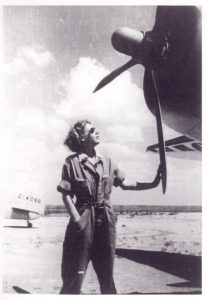 Yes, and also when they enlisted, they signed all kinds of papers. They signed away at least the next five years of their life. When they joined up, they weren’t militarized at that time. Then there was a militarization act in 1943, I think it was. But then they got disbanded in 1944. And before that, the program existed, but it was like not official official. There were two organizations for ferrying services. Jackie Cochran’s group–she took American women over to England to fly for the ATA, and that was to kind of prove that they could do it. And then she came back and started the Women Airforce Service Pilots (WASP). And she had the half-ear of General Arnold and Eleanor Roosevelt. She was very much like, “If you start this up, you have to let me be the head of this organization.” Some are Nancy Love diehards and think of Jackie Cochran as harsh. But really, Jackie was this visionary who had this idea for a long time. She wanted women to fly for the military.
Yes, and also when they enlisted, they signed all kinds of papers. They signed away at least the next five years of their life. When they joined up, they weren’t militarized at that time. Then there was a militarization act in 1943, I think it was. But then they got disbanded in 1944. And before that, the program existed, but it was like not official official. There were two organizations for ferrying services. Jackie Cochran’s group–she took American women over to England to fly for the ATA, and that was to kind of prove that they could do it. And then she came back and started the Women Airforce Service Pilots (WASP). And she had the half-ear of General Arnold and Eleanor Roosevelt. She was very much like, “If you start this up, you have to let me be the head of this organization.” Some are Nancy Love diehards and think of Jackie Cochran as harsh. But really, Jackie was this visionary who had this idea for a long time. She wanted women to fly for the military.
And that’s the thing with our series. These characters are human beings. They’re complicated; they’re flawed. Our series is not going to be this rosy tone. There’s a lot of layers, a lot of complexities, a lot of things going on. Not everybody agreeing with how things are done. You can imagine. A lot of interesting things. Does the end justify the means? How far are you willing to go to get your vision created? All those kinds of questions. A lot of the women enter very wide-eyed thinking this is just a lark until they become friends with a woman who died. Because the women were not officially military–it’s so confusing.
The women who went through the first classes were second lieutenant and they received second lieutenant pay. Then when things changed a bit, some of the other women who came along after that didn’t necessarily graduate with this rank. So when they did get veteran status, their children were trying to get them veteran’s benefits, and they had to fill out these forms with questions like, “What was your rank?” A lot of the children didn’t know how to fill that in for their moms. When a woman died, the army did not pay for them to be sent home for a funeral to happen. The family had to pay. If the families couldn’t afford it, then the women pilots would take up a collection amongst themselves to pay for that. With Jackie Cochran, you didn’t want to make a big stink about that ’cause they didn’t want the program to be cut. And the program eventually was cut, and these women were so broken up about it ’cause it really hurt them right to the core. They showed up to work, and they just got these orders saying, “You’re dismissed. right now, you’re dismissed. You’ve got to go home.” And they thought they were there for the next five years. And it had been incredibly fulfilling and meaningful. Not like you or I–we get dismissed by the military and we have these options. What were they gonna do? They certainly weren’t going to fly planes.
That’s right. A lot of those women probably went home and started a family after the war. And I would say for many of these women, getting married and having a family was not their first choice. {pause} I think it’s great that you’re not doing it like a documentary because there have been so many. There is something about a historical scripted series that makes you a little more emotionally involved.
I think a documentary–I mean don’t get me wrong. I have seen some amazing documentaries. Don’t get me wrong. I love documentaries. I go to Sundance every year, and I have seen some incredible documentaries or non-fiction films. A lot of documentaries do tell a great story, but it’s different when it’s a story because there are so many different elements that an audience could grab onto and make it their own. Then it does become more a give and take between us–the storytellers, the filmmakers–and the audience. You know, you create this thing and put it out there, and you perceive it differently from what someone else might. And that’s great. It’s what you pick up on and what’s going to be important to you. It’s going to be different how I experience it or whatever’s important to me. With a documentary, it’s like you’re given the subject. They’re real people. It depends on how the “documentarian” goes about it. If they’re more like a reporter and have two sides to it…it just depends now. Some non-fiction films really follow through the people as characters. You just sort of follow along their life, their story, their journey. But it’s not so much their side or their viewpoint. It’s like this is what they’re experiencing.
Like I said, the women as subjects are incredible, but they’re limited by their times. They’re limited by their generation. They’re limited by how they grew up. They don’t really have that introspection button or that ability to stand outside of themselves and look. We’re in an age where we are such a narcissistic society where everyone is looking at themselves and evaluating themselves and talking about themselves and how they matter in relation to the world. And these women are just like–here we are and this is what we did and how it was. Like Bee Haydu–I asked Bee about Jesse Owens and if she remembered when Jesse Owens won and if it was kind of like a big deal. Now, granted, she’s ninety-five, and I’m asking her to go way back to when she was a teenager. But in mentioning race, she was like, “Yeah, well, that’s the way it was. I’m Jewish. I would look for jobs in the ’30’s, and I’m from New York, and it would say, ‘Jews need not apply’ in the paper. And that’s the way it was.” And she says it like this–matter-of-factly. “I got a job. I was hired by a Jewish man.” And she just keeps going. There’s no “Pity me” or “I had to overcome this anti-Semitism” or “This world was so tough.” That was the way it was, and she just did her thing. So if we were to do a documentary, we would be somewhat limited, I think, by their perspective. Wheras doing it as fiction, we can really delve into different perspectives.
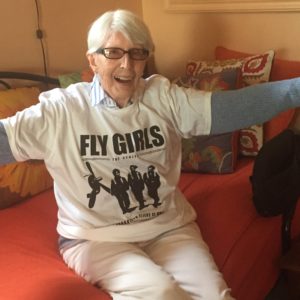 They were disbanded because there was a group of male cadets coming through who enlisted thinking they were going to be air force cadets. General Marshall decided he needed ground troops. So they were all transferred over to ground troops, and they were all really upset by that. I understand where the cadets were coming from, but these women were targeted by some of these male journalists who called them all kinds of names–“glamor girls,” for example. This journalist is kind of our villain in the story. He plagues the program from the beginning. He doesn’t insinuate; he prints rumors. He would say that Jackie and General Arnold are having an affair, and that’s how Jackie became the head of the group. There was a lot of pressure, and these women went on performing their duties on bases around the country. So when Congress was having these hearings, first of all, they couldn’t just leave work. But second of all, how would they have even gotten to Washington? They would have to take a train ’cause there were no planes flying. No commercial planes–everything was for the war. You couldn’t just hop on a plane to D.C. and testify before Congress. They were the women, and who cares about these women? You could just get rid of them.
They were disbanded because there was a group of male cadets coming through who enlisted thinking they were going to be air force cadets. General Marshall decided he needed ground troops. So they were all transferred over to ground troops, and they were all really upset by that. I understand where the cadets were coming from, but these women were targeted by some of these male journalists who called them all kinds of names–“glamor girls,” for example. This journalist is kind of our villain in the story. He plagues the program from the beginning. He doesn’t insinuate; he prints rumors. He would say that Jackie and General Arnold are having an affair, and that’s how Jackie became the head of the group. There was a lot of pressure, and these women went on performing their duties on bases around the country. So when Congress was having these hearings, first of all, they couldn’t just leave work. But second of all, how would they have even gotten to Washington? They would have to take a train ’cause there were no planes flying. No commercial planes–everything was for the war. You couldn’t just hop on a plane to D.C. and testify before Congress. They were the women, and who cares about these women? You could just get rid of them.
While you don’t know for sure, when are you looking to hopefully start production?
We are hoping in the next year to start production or pre-production, I guess. Miracles could happen. We could start pre-production by the end of the year. It really depends on how quickly we raise this next chunk of money. Because money talks. You can get the people you want on board when you have money in a bank account. But one of the reasons we are so open is that we want people like you reaching out and writing about us. We really wanna show that we have an audience because that’s what Matia has come up against all these years. People say, “Well, why hasn’t she done this?” “Why hasn’t she gone to Tom Hanks?” I don’t know how many times we get that. Once we get the writers to come on, those writers will be having a meeting I think. It’s going to take some time to develop, especially if we’re talking about ten episodes. We’ve done a lot of research, but the writers are going to have to absorb the research.
First of all, ten years ago, when she pitched this idea as a movie, even for us women, you have to think about women in Hollywood. They laughed–a movie with a whole bunch of women? I mean there’s a lot of great male roles too, but our show, the main people are going to be women.
The other thing that Hollywood couldn’t understand was that because they weren’t in combat, they were like, “Where’s the combat?” And it was like, “Wow, you’re that narrow-minded that you can’t understand what they did.” Leaving home for the first time. A lot of their parents weren’t happy with them. Their parents and friends would say, “Oh, you’re just going down to the base to chase the boys.” Elaine Harmon–whose grandchildren have been very supportive of the project–there are interview clips of her online, where she said, “Yeah, my mom called me this and that.”
Wings Across America is a good website to look up if you want more factual information on what the different women were like. And our website too. We have a lot of stuff on our blog. We’re trying to develop an audience for this program, and that’s what we’re trying to do via social media. We’re showing that we have many new fans every day, and not only that, but our posts reach five and six and seven times that amount. We’re learning who are fans are. People are sharing. People are excited. And also our audience base is pretty much fifty-fifty between male and female. So there’s definitely a male interest and now with the Hunger Games and with Divergent, men are now getting more used to seeing stories where the female is the protagonist. When I was growing up, I read the Hardy Boys. I read all these different books where boys were the protagonists. Then ask guys how many of them had to watch The Color Purple or Their Eyes Were Watching God and many more amazing books where women or young girls are the protagonists. The boys weren’t reading Nancy Drew.
 So now I think our times are really changing. We’re watching female athletes. It’s a real different world. Matia still struggles with the gender bias and the age bias. We are trying to maintain creative control with this work so that Matia can direct the pilot. Even with her directing–though it is her work and she has a vast number of works and she’s an Oscar-nominated director–even with that, they have to make sure that she can direct. It’s a crazy business.
So now I think our times are really changing. We’re watching female athletes. It’s a real different world. Matia still struggles with the gender bias and the age bias. We are trying to maintain creative control with this work so that Matia can direct the pilot. Even with her directing–though it is her work and she has a vast number of works and she’s an Oscar-nominated director–even with that, they have to make sure that she can direct. It’s a crazy business.
We’re not an independent movie. We’re not an independent show or anything. We want to do it right. We want to do it like Band of Brothers. So we do need those kinds of resources. It should get wide distribution, so that everyone around the world sees what girls can do. You know, women haven’t just arrived. {laughs} And to your point earlier, when I found out about these women, I was like “Wow!” ‘Cause I’m a history buff. I was a history major. I did all this research on women, and I was reading primarily about the Civil War and all the women that fought in that war. And then it’s even harder to find records of this, but I’m sure there were women who fought in the Revolution. Not much has been documented, but it’s clear that women did. Traditionally, it’s always men doing everything. I don’t think women have just arrived. I don’t think we’ve been this coquettish, dainty gender. We were here. Pioneer women were tough as nails women, and sure, everybody knew how to fire a gun, use a bow, build a fire, use a knife to skin animals. People knew how to survive.
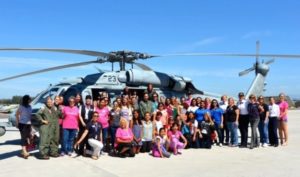 We also have the exclusive rights to several diaries and memoirs, so that’s something that also makes our project special. We have the rights to Pauline Gower, and she was the head of the women’s ATA in England. She was the head of the British ATA. We also have rights to a book called The Final Approach, which was written by a WASP and was the first book of its kind that told the story. It’s a hard book to read. God bless her. She took all the notes and the dossiers and pictures and put them together. She’s gotten some criticism ’cause with some of the events and some of the deaths, she had incorrect information, but that’s because she was going on the information that she had at the time. And the subject material is really hard to get it right because when you’re looking back through–here’s an example. Cornelia Fort was the first woman who died flying for the U.S. She was actually in the air as a flight instructor in Hawaii when the Japanese came over Pearl Harbor. There were three instructors in the air that day. And she was one of them, and she was the only one who survived. But she’s not in the movie Pearl Harbor or anything like that. She gave an account of her experience in her own words. In these articles, she said she was flying a Piper Cub 3C. Well, that wasn’t true. Some people went to the museum to check out her story, and I liked it. So we put out this thing on Facebook and then someone corrected us. So I was going back through all my sources, and they all say–she herself says this.I love this book on Cornelia. There was a lot of controversy about her death. For our series, we’re gonna have to have a lot of researchers for fact-checking. Hopefully, we won’t make a mistake, but we probably will. {laughs} It’s just the nature of the thing, right? And some people get mad at us. But all I can say is that we’re trying our best to make sure that all the details are accurate. You do the best you can.
We also have the exclusive rights to several diaries and memoirs, so that’s something that also makes our project special. We have the rights to Pauline Gower, and she was the head of the women’s ATA in England. She was the head of the British ATA. We also have rights to a book called The Final Approach, which was written by a WASP and was the first book of its kind that told the story. It’s a hard book to read. God bless her. She took all the notes and the dossiers and pictures and put them together. She’s gotten some criticism ’cause with some of the events and some of the deaths, she had incorrect information, but that’s because she was going on the information that she had at the time. And the subject material is really hard to get it right because when you’re looking back through–here’s an example. Cornelia Fort was the first woman who died flying for the U.S. She was actually in the air as a flight instructor in Hawaii when the Japanese came over Pearl Harbor. There were three instructors in the air that day. And she was one of them, and she was the only one who survived. But she’s not in the movie Pearl Harbor or anything like that. She gave an account of her experience in her own words. In these articles, she said she was flying a Piper Cub 3C. Well, that wasn’t true. Some people went to the museum to check out her story, and I liked it. So we put out this thing on Facebook and then someone corrected us. So I was going back through all my sources, and they all say–she herself says this.I love this book on Cornelia. There was a lot of controversy about her death. For our series, we’re gonna have to have a lot of researchers for fact-checking. Hopefully, we won’t make a mistake, but we probably will. {laughs} It’s just the nature of the thing, right? And some people get mad at us. But all I can say is that we’re trying our best to make sure that all the details are accurate. You do the best you can.
How many people say something wrong or remember a certain event differently? And I think it’s great that you’re going about this series historically so it’s like historical fiction. When I read or watch something labeled historical fiction, I always expect that some things are not going to be true. And you have your creative license. But at least you’re going the route of series as opposed to documentary.
Yeah, exactly. Here’s something that we might make up. The idea that a woman air force pilot goes to a factory to pick up a plane and the factory is filled with women. Now we don’t have a specific WASP that told us this story or read it, but we do know that women were in the factories and women were building these planes. This could happen too. A WASP ferries the plane to Tuskegee and she realizes there’s black men ahead–she had no idea. And then there’s some women at Tuskegee. We will do things like that. That’s where our fiction will come in.
Also extrapolating what we can in terms of the relationship between the women. Especially our main women. Our series is based around four. Four women are the primary characters. We’ll be teasing what we can out of diaries and things. There are things people didn’t talk about back then. Homosexuality is one of them. We do think that one of our main characters…she actually drank herself to death after the WASPS because she couldn’t fly. She was actually Amelia Earhardt’s contemporary. She raced with Amelia Earhardt. Amelia was one of her best friends. As was Ernie Pyle. She lost Amelia and she lost Ernie, and she was living at a time when she couldn’t fly..couldn’t do what she loved. And we guess that she may also have been gay. And since she couldn’t be gay, she committed suicide. That’s what we think. We don’t know why she committed suicide. We’ll be looking at things and making our best guess. She doesn’t commit suicide in our series. Looking at people’s lives and trying to understand them and figure out what happened. And that’s why we want creative control so we can look at some things like that.
From what you have told me, I could imagine that there would be a market for such a show. Because there’s not anything like this right now.
Exactly! That’s what our desire is, and we so hope that everyone will check out our website and embrace our vision. This is a story that needs to be told, and we are honored to be part of the process to make this series a reality. I so want it for Matia, her mom, and all those women she promised.
Conversing with Hilary was truly a pleasure as I learned so many captivating details that merely inspire me to wish this show were in the fall premiere line-up! But thankfully, Hilary and the entire crew realize that accomplishing anything like this in the correct and necessary way requires a certain kind of fortitude that not everyone possesses. Hilary is extremely committed to this project as she follows the lead of the creator, Matia. The fact that this has been a love child that has been birthed over so many years makes it a genuinely unique series whose time is quickly approaching, in my humble opinion. Let’s be the ones that aid in this project going into full labor and finally splashing across our screens with a kind of distinctiveness that we do not see every day. Please follow the show and Hilary at all the links below, and let’s assist the entire creative force to get the word out about this show. I would definitely be a viewer. What about you?
FOLLOW FLYGIRLS
Website
FOLLOW HILARY

